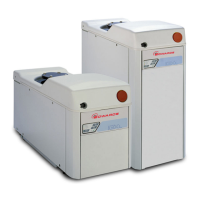© Edwards Limited 2014. All rights reserved. Page 27
Edwards and the Edwards logo are trade marks of Edwards Limited.
Maintenance
A546–00–880 Issue E
5Maintenance
5.1 Safety and maintenance frequency
Ensure that the maintenance technician is familiar with the safety procedures which relate to the products
pumped.
Allow the pumps to cool to a safe temperature before fitting lifting bolts or starting maintenance work.
Vent and purge the dry pumping system with nitrogen before starting any maintenance work.
Isolate the dry pumping system and other components in the process system from the electrical supply so
that they cannot be operated accidentally. Note that the emergency stop switch on the dry pumping system
is not an electrical isolator, unless a disconnect box accessory is installed.
Wait for at least four minutes after switching off the electrical supply before touching any electrical
component on the dry pumping system.
Route and secure cables, hoses and pipelines during maintenance to avoid possible risk of trips or
entrapment.
Ensure that any oil or water collected in the secondary containment drip tray is removed before moving the
system.
The enclosure panels should only be removed with the use of a special tool, when the system has been
switched off and allowed to cool sufficiently (as an indication the system should be left for one hour with
cooling water still connected at the flow rate specified in Ta ble 1 .
Only personnel specially trained to perform electrical maintenance should attempt
troubleshooting inside electrical enclosures. These enclosures contain hazardous voltages and are
not operator areas.
Leak test the system after installation and seal any leaks found to prevent leakage of dangerous
substances out of the system and leakage of air into the system.
Only personnel specially trained to perform electrical maintenance should attempt
troubleshooting inside electrical enclosures. These enclosures contain hazardous voltages and are
not operator areas.
Personal protection equipment should be checked and used as specified by its supplier. Hazardous
chemicals that have been pumped are located within the pumps and piping. Use of suitable
protective gloves and clothing along with a respirator is recommended if contact with substances
is anticipated.
Particular caution should be exercised when working with Fomblin
®
oil which may have been
exposed to temperatures greater than 260 °C. Refer to Edwards Material Safety Data Sheets for
detailed information.

